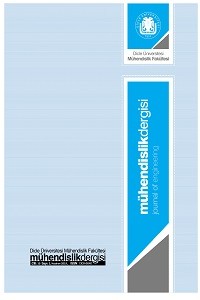Öz
Anahtar Kelimeler
Stable processes Inverse response processes Time delay PI controller Integral performance criteria
Kaynakça
- Åström, K. J. (1970) Introduction to Stochastic Control Theory. Academic Press.
- Ali, A. ve Majhi, S. (2011) ‘Integral criteria for optimal tuning of PI/PID controllers for integrating processes’, Asian Journal of Control, 13(2), pp. 328–337.
- Camacho, O., Rojas, R. ve Garcia, W. (1999) ‘Variable structure control applied to chemical processes with inverse response’, ISA Transactions, 38, pp. 55–72
- Chen, C.-T. (1993) Analog and Digital Control System Design: Transfer-function, State-space, and Algebraic Methods. Saunders College.
- Chien, I.-L., Chung, Y.-C., Chen, B.-S., Chuang, C.-Y. (2003) Simple PID controller tuning method for processes with inverse response plus dead time or large overshoot response plus dead time. Ind. Eng. Chem. Res. (42), pp. 4461–4477.
- Dorf, R. C., Bishop, R. H. (1995) Modern Control Systems. Addison-Wesley.
- Jeng, J. C., ve Lin, S. W. (2012) ‘Robust proportional-integral-derivative controller design for stable/integrating processes with inverse response and time delay’, Ind. Eng. Chem. Res. 51(6), pp. 2652–2665.
- Kaya, İ. (2001) ‘Tuning Smith predictors using simple formulas derived from optimal responses’, Ind. Eng. Chem. Res., 40(12), pp. 2654–2659.
- Kaya, İ., ve Cengiz, H. (2017) ‘Optimal Tuning of PI/PID Controllers for Integrating Processes with Inverse Response’, International Conference on System Theory, Control and Computing, ICSTCC 2017, pp. 722–727.
- Kaya, İ. (2018a) ‘Controller design for integrating processes with inverse response and dead time based on standard forms’, Electrical Engineering, 100(3), pp. 2011-2022.
- Luyben, W. L. (2000) ‘Tuning proprotional-integral controllers for processes with both inverse response and deadtime’, Ind. Eng. Chem. Res., 39(4), pp. 973–976.
- Luyben, W. L. (2003) ‘Identification and tuning of integrating processes with deadtime and inverse response’, Ind. Eng. Chem. Res., 42(13), pp. 3030–3035.
- Shamsuzzoha, M. ve Skogestad,S. (2010) ‘The setpoint overshoot method: A simple and fast closed loop approach for PID tuning’, J. Process Control. 20(10), pp. 1220–1234.
- Skogestad. S. (2003) ‘Simple analytic rules for model reduction and PID controller tuning’, J. Process Control, 13, pp. 291–309.
- Visioli, A. (2001) ‘Optimal tuning of PID controllers for integral and unstable processes’, IEE Proceedings Control-Theory and Applications. 148(2), pp. 180–184.
- Zhuang, M., ve Atherton, D. P. (1993) ‘Automatic tuning ofoptimum PID controllers’, IEE Proceedings-D,Control theory and applications, 140(3), pp. 216-224.
Öz
PID tip denetleyiciler endüstriyel uygulamalarda çok yaygın olarak kullanılmaktadırlar.
Bu denetleyicilerin ayar parametrelerini belirlemek için literatürde birçok
tasarım yaklaşımlarının kullanıldığı görülmektedir. İntegral performans indeksi
PID tip denetleyicilerin ayar parametrelerini belirlemede sıklıkla kullanılan
yaklaşımlardan biridir. Bu çalışmada, kararlı ters cevaplı artı zaman gecikmeli
süreçleri denetlemede kullanılacak optimal PI parametrelerini veren analitik
denklemlerin türetilmesi verilmiştir. Bu amaçla, kararlı ters cevaplı artı
zaman gecikmeli süreçleri tanımlayan bir model varsayılmış ve kontrol yapısının
hata fonksiyonu üzerinde tekrarlanan optimizasyon işlemleri ile süreç transfer
fonksiyonu parametreleri ile PI denetleyici parametreleri arasındaki ilişkiyi
veren analitik denklemler ISTE, IST2E ve IST3E integral
performans kriterlerine dayalı olarak elde edilmiştir.
Anahtar Kelimeler
Kararlı Süreçler Ters Cevaplı Süreçler Zaman Gecikmesi PI Controller İntegral Performans Kriteri
Kaynakça
- Åström, K. J. (1970) Introduction to Stochastic Control Theory. Academic Press.
- Ali, A. ve Majhi, S. (2011) ‘Integral criteria for optimal tuning of PI/PID controllers for integrating processes’, Asian Journal of Control, 13(2), pp. 328–337.
- Camacho, O., Rojas, R. ve Garcia, W. (1999) ‘Variable structure control applied to chemical processes with inverse response’, ISA Transactions, 38, pp. 55–72
- Chen, C.-T. (1993) Analog and Digital Control System Design: Transfer-function, State-space, and Algebraic Methods. Saunders College.
- Chien, I.-L., Chung, Y.-C., Chen, B.-S., Chuang, C.-Y. (2003) Simple PID controller tuning method for processes with inverse response plus dead time or large overshoot response plus dead time. Ind. Eng. Chem. Res. (42), pp. 4461–4477.
- Dorf, R. C., Bishop, R. H. (1995) Modern Control Systems. Addison-Wesley.
- Jeng, J. C., ve Lin, S. W. (2012) ‘Robust proportional-integral-derivative controller design for stable/integrating processes with inverse response and time delay’, Ind. Eng. Chem. Res. 51(6), pp. 2652–2665.
- Kaya, İ. (2001) ‘Tuning Smith predictors using simple formulas derived from optimal responses’, Ind. Eng. Chem. Res., 40(12), pp. 2654–2659.
- Kaya, İ., ve Cengiz, H. (2017) ‘Optimal Tuning of PI/PID Controllers for Integrating Processes with Inverse Response’, International Conference on System Theory, Control and Computing, ICSTCC 2017, pp. 722–727.
- Kaya, İ. (2018a) ‘Controller design for integrating processes with inverse response and dead time based on standard forms’, Electrical Engineering, 100(3), pp. 2011-2022.
- Luyben, W. L. (2000) ‘Tuning proprotional-integral controllers for processes with both inverse response and deadtime’, Ind. Eng. Chem. Res., 39(4), pp. 973–976.
- Luyben, W. L. (2003) ‘Identification and tuning of integrating processes with deadtime and inverse response’, Ind. Eng. Chem. Res., 42(13), pp. 3030–3035.
- Shamsuzzoha, M. ve Skogestad,S. (2010) ‘The setpoint overshoot method: A simple and fast closed loop approach for PID tuning’, J. Process Control. 20(10), pp. 1220–1234.
- Skogestad. S. (2003) ‘Simple analytic rules for model reduction and PID controller tuning’, J. Process Control, 13, pp. 291–309.
- Visioli, A. (2001) ‘Optimal tuning of PID controllers for integral and unstable processes’, IEE Proceedings Control-Theory and Applications. 148(2), pp. 180–184.
- Zhuang, M., ve Atherton, D. P. (1993) ‘Automatic tuning ofoptimum PID controllers’, IEE Proceedings-D,Control theory and applications, 140(3), pp. 216-224.
Ayrıntılar
| Birincil Dil | Türkçe |
|---|---|
| Bölüm | Makaleler |
| Yazarlar | |
| Yayımlanma Tarihi | 20 Haziran 2019 |
| Gönderilme Tarihi | 15 Mayıs 2019 |
| Yayımlandığı Sayı | Yıl 2019 Cilt: 10 Sayı: 2 |


